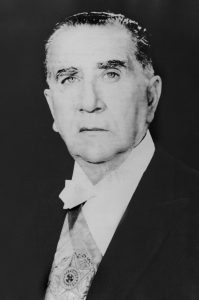Brazil, with the record of winning five World Cup trophies, is known for their playing style in football. Usually referred to as a ‘Samba soccer’, Brazilian soccer was based on fantastic individual skills. That was what fascinated people and made Brazilian soccer ‘great’. In a report by ESPN Brazil, he expected that Brazil “could be sending the least Brazilian team of all time to the 2018 World Cup…” Manager Tite was newly elected as a manager for Brazilian squad in 2016. Although at the beginning of his call-ups for the national team, he picked eight players from the Brazilian league. ESPN expects that only two players from Brazilian League will go to Russia to play on the World Cup. When the Brazilian soccer shined the most, none of the ‘foreign’ players were on the team. Everyone from the national team was in Brazilian League and they were able to win two consecutive World Cups in 1958 and 1962.

Getty Images
When did Brazil start to ‘lose’ their own style of soccer? It was after the success of Brazilian soccer until the seventies. Up until 1970 World Cup, Brazil had won three World Cups out of four. However, the government at the time, under military control, did not like ‘samba soccer’. Individual skills were ignored under Captain Claudio Coutinho and instead, teamwork and physical attributes were praised. He defined dribble as “our specialty as ‘a waste of time and proof of our weakness” (122). Brazilian specialty and power were degraded by the military government to an extent of a waste of time and weakness.

Former President of Brazil
After Brazil won the World Cup in 1970, General Emilio Medici’s government declared a national holiday, rewarding each player with the equivalent amount of 18,500 U.S. dollars, tax-free. Medici declared “I identify this victory, achieved in the fraternity of sport, with the ascension of faith in our struggle for national development.” (122). Opinion Poll in 1970 stated that “90 percent of Brazil’s lower classes identified soccer with the nation.” (122) However, after the victory in 1970, Claudio Coutinho who was the manager of the national team was given a mission to modernize the Brazilian playing style. Instead of individual skills, teamwork and discipline were emphasized as Medici’s government made efforts to modernize the Brazilian economy.
After the ‘modernization’, Brazil started to lose their specialty. We see players like Neymar and fascinate because he plays Brazilian style of soccer. His dribbling skills and self-centeredness remind people of ‘samba soccer’ that people missed. Brazilian league, once considered one of the greatest, still produces great players but they no longer stay in the league like the past. What military government did in the past was not a modernization. Instead, it was ignorance of culture and style.
Work cited:
“Brazil Could Send ‘Least Brazilian’ Team of All Time to ’18 World Cup.” ESPN, ESPN Internet Ventures, 21 Mar. 2018, www.espn.com/soccer/club/brazil/205/blog/post/3427421/brazil-could-send-least-brazilian-team-of-all-time-to-world-cup-in-russia.
Shirts, Matthew. “Playing Soccer in Brazil: Socrates, Corinthians, and Democracy.” The Wilson Quarterly (1976-) 13, no. 2 (1989): 119-23. http://www.jstor.org/stable/40257497
